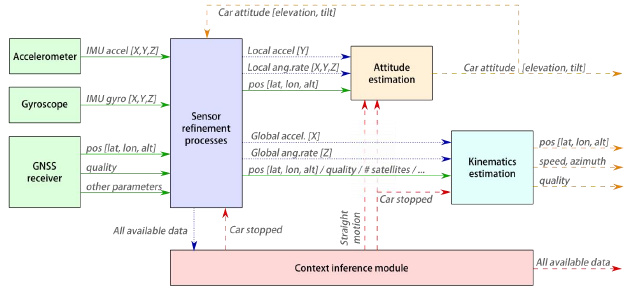I'm curious, after they turned off Selective Availability, how much was GPS improved? This sounds pretty significant.Boffins at Madrid's Carlos III University have used cheap accelerometers and gyroscopes - and expensive mathematics - to improve the accuracy of GPS* by as much as 90 per cent.
The team compared their results to differential GPS - which is about as good as satellite systems get - and found that with detailed analysis of the data coming from three cheapish accelerometers and three gyroscopes they could get reliable accuracy down to below 2 metres, and critically they could do so without calibrating their kit to match the vehicle in which it was fitted.
Satellite navigation systems, including GPS, are normally accurate to 10 metres or so, but that accuracy falls off rapidly as one enters an urban environment where buildings block, and reflect, signals. In an urban setting, the boffins say, "the determination of a vehicle’s position can be off by more than 50 metres". Differential GPS, which uses a known location to monitor drift caused by atmospheric changes, is more accurate, but still can't account for passing buildings, so navigation systems fall to guessing.
The Spanish boffins aren't doing much more than that, but their guesses are very well-informed and made using accumulated data.
Comparable systems, such as those deployed in autonomous vehicles which really need to be quite accurate, use hugely expensive gyroscopes that cost over $30,000, according to the research paper (PDF, one-third interesting, two-thirds impenetrable, your mileage may vary), while the Spaniards used cheap kit which calibrates while driving - constantly guessing on its location by measuring changes in velocity and maneouvres performed by the vehicle, then checking the GPS and refining the process to improve accuracy.
It was soon after this point the paper descended into mathematical formula
Not only was the team able to accurately monitor progress, despite the inconsistency of a vehicle's motion down a normal road - weeding out the bumps, stops and starts, to accurately record motion, but it was also able to demonstrate how the system could use knowledge of the terrain to improve accuracy further - by knowing when one is driving up a hill, for example.
But even without that the team managed an improvement between 50 and 90 per cent, compared to GPS, outperforming differential GPS by a significant margin. That's probably still not good enough for an autonomous car (two meters to the left still kills a lot of pedestrians) but demonstrates how clever processing can get a lot of mileage out of cheap sensors.
Now the team is going to see how its algorithms might be applied to the sensors in a mobile phone, which is an order of magnitude more complicated but raises some interesting possibilities. ®
* GPS (Global Positioning System) is a satnav system that provides data on the receiver's location and time at any place on the planet where the receiver has an unobstructed line of sight to four or more GPS space satellites. The sats transmit a message with info on their positions at the time of transmission as well as the time the message is sent. The receiver then calculates its position by computing the distance to each satellite using the speed of light.
Spanish boffins increase GPS accuracy by 90%
Moderator: Moderators
- Sabre
- DCAWD Founding Member
- Posts: 21432
- Joined: Wed Aug 11, 2004 8:00 pm
- Location: Springfield, VA
- Contact:
Spanish boffins increase GPS accuracy by 90%
The Reg
Sabre (Julian)

92.5% Stock 04 STI
Good choice putting $4,000 rims on your 1990 Honda Civic. That's like Betty White going out and getting her tits done.

92.5% Stock 04 STI
Good choice putting $4,000 rims on your 1990 Honda Civic. That's like Betty White going out and getting her tits done.
- ElZorro
- DCAWD Founding Member
- Posts: 5958
- Joined: Thu Aug 12, 2004 8:00 pm
- Location: USA! USA!
Re: Spanish boffins increase GPS accuracy by 90%
GPS accurace increased drastically after SA was turned off. Its improved alot with more SVs and more channels in the receivers.
What they're doing with using accelerometer data and road/terrain data really isn't that new...
I see the 'so what', but I don't think they're the first. Oh well.
What they're doing with using accelerometer data and road/terrain data really isn't that new...
I see the 'so what', but I don't think they're the first. Oh well.
Jason "El Zorro" Fox
'17 Subaru Forester 2.0XT
DCAWD - old coots in fast scoots.
'17 Subaru Forester 2.0XT
DCAWD - old coots in fast scoots.
- zaxrex
- DCAWD Founding Member
- Posts: 6350
- Joined: Mon Sep 06, 2004 8:00 pm
- Location: asiandale
Re: Spanish boffins increase GPS accuracy by 90%
I would like to see the time based performance. Moving spinning things around and not taking absolute reference points tend to decrease their accuracy after a while.
Maybe that is what the maths do, predict the degradation and re-calculate.
Maybe that is what the maths do, predict the degradation and re-calculate.
Patience is the ability to idle your motor when you feel like stripping your gears
